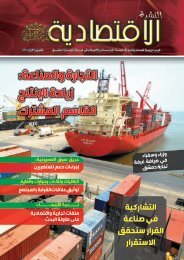SIGAR
2017-01-30qr
2017-01-30qr
Create successful ePaper yourself
Turn your PDF publications into a flip-book with our unique Google optimized e-Paper software.
<strong>SIGAR</strong> OVERSIGHT ACTIVITIES<br />
remote or insecure areas of Afghanistan where there is little or no direct<br />
U.S. oversight. The United States depends on multiple tiers of Afghan<br />
contractors and subcontractors to perform work on these projects. These<br />
contractors face safety and financial risks by accepting work relating to<br />
these contracts, and when there is a contract dispute, the subcontractors<br />
in particular have little practical recourse. Afghan subcontractors and<br />
their representatives have also told <strong>SIGAR</strong> that Afghan subcontractors<br />
often blame the U.S. government when they are not paid for their work on<br />
a reconstruction project, even though the U.S. government does not have<br />
a direct contractual relationship with the subcontractors. Of particular<br />
concern are the reports by Afghan contractors that thousands of Afghan<br />
workers remain unpaid and may consider cooperating with insurgent forces<br />
out of frustration and the need for money.<br />
Given the persistence of contractor nonpayment disputes and the<br />
associated risks to the Afghanistan reconstruction effort, these issues warrant<br />
further attention from both the U.S. and Afghan governments. After<br />
speaking with USACE staff, Afghan contractor representatives, and other<br />
stakeholders, as discussed throughout this report, <strong>SIGAR</strong> identified some<br />
actions that could help address some of the root causes of contractor<br />
nonpayment disputes and lead to more equitable outcomes for all parties<br />
involved. By considering whether some of the suggested actions present<br />
feasible ways of addressing the challenges many Afghan contractors<br />
face, U.S. government agencies operating in Afghanistan may be able to<br />
eventually reduce risks and encourage greater local cooperation with the<br />
Afghanistan reconstruction effort. These suggested actions may also help<br />
expedite resolution of disputes where the Afghan contractor performed<br />
shoddy or inadequate work—or no work at all.<br />
<strong>SIGAR</strong> conducted this special project in Washington, DC from July 2015<br />
to November 2016, in accordance with <strong>SIGAR</strong>’s quality control standards.<br />
LESSONS LEARNED<br />
<strong>SIGAR</strong>’s Lessons Learned Program was created to identify and preserve<br />
lessons from the U.S. reconstruction experience in Afghanistan and make<br />
recommendations to Congress and executive agencies on ways to improve<br />
our efforts in current and future operations. Its first report, Corruption in<br />
Conflict, was published in September 2016. The program has five projects in<br />
development: interagency strategy and planning, counternarcotics, privatesector<br />
development, security-sector reconstruction, and stabilization.<br />
INVESTIGATIONS<br />
During the reporting period, <strong>SIGAR</strong> criminal investigations resulted in<br />
one conviction and six sentencings; nearly $2 million in criminal fines and<br />
REPORT TO THE UNITED STATES CONGRESS I JANUARY 30, 2017<br />
43







